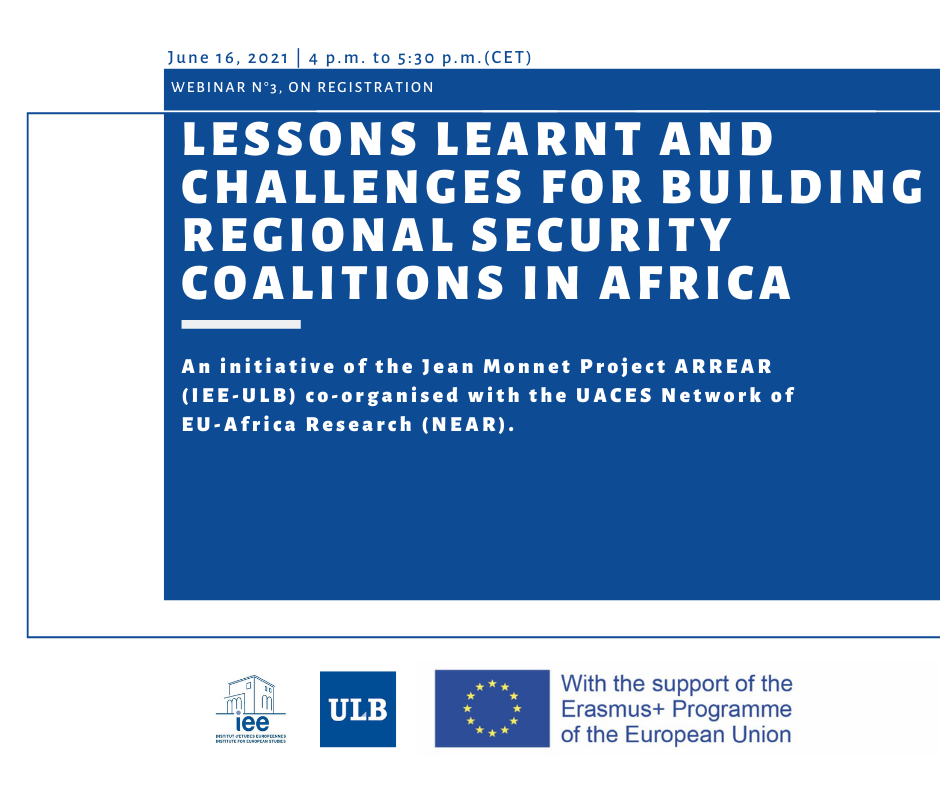Webinar series : Trends of convergence and divergence in EU-Africa relations
In recent years, Africa has made significant progress in regional integration, in particular with the creation of a continental free trade area, the regionalization of conflict management and an increased capacity of regional institutions, such as the African Union (AU). These developments have important implications for the relationship between the European Union (EU) and Africa and have let to new strategies and instruments in a wide range of fields, in particularly in the domain of security. Yet, the overall direction of the revolving interregional relations is not always evident, not least because the delineations of the coalition-building are constantly evolving.
In order to address the ongoing contemporary and complexity of EU-Africa relations, a short series of webinars will address trends of convergence and divergence in three layers: security cooperation in the Sahel, aid and trade in the post-Cotonou era and interregional coalitions. The objective of these virtual events is to bring together experts that discuss their respective perspectives on how Euro-African relations are evolving in light of the profound changes occurring on both sides.
The webinar series also constitutes a preparatory event for a larger academic symposium and policy dialogue on EU-Africa relations, envisaged to take place in Brussels later this year. The initiative is part of the Jean Monnet Project “A reassessment of relations between the EU and African regionalisms (ARREAR)” coordinated at the Institute for European Studies of the Université libre de Bruxelles (IEE-ULB) and co-organised with the UACES Network of EU-Africa Research (NEAR).
Webinar 3 : Lessons learnt and challenges for building regional security coalitions in Africa
The third webinar, animated by Dr. Amandine Gnanguênon, focuses on lessons learnt and challenges for building regional security coalitions in Africa.
The aim of this seminar is thus to discuss challenges and lessons learnt, including:
– The experience of African states with building regional coalitions;
– The motivations of African states to create coalitions and whether they different from Western countries;
– The stated and unstated objectives, of African states that build coalitions and the resources invest to achieve them;
– The main political, financial and institutional obstacles to the creation of African coalitions and the success of their missions;
– The extent to which EU support influences the creation and survival of African coalitions; and
– How the EU takes into account the challenges experienced by coalitions in the development of its support.
Speakers :
- Dimpho Deleglise, Associate Research Fellow, United Nations University – Institute on Comparative Regional Integration Studies (UNU-CRIS)
- Katharina Döring, Researcher, Södertörn University Stockholm
-
Daniel Grammatico, Head of the EU’s Regional Advisory and Coordination Cell to the Sahel
- Hallelujah Lulie, Visiting Fellow, European Council on Foreign Relations (ECFR)
- Yf Reykers, Assistant Professor, Maastricht University
Practical information for webinar n°3 :
When ? Wednesday 16 June at 4 p.m. to 5.30 p.m. (CET)
Where ? Online
If you want to have information about the first webinar :
If you want to have information about the second webinar :
Registration
Registration for this event is complete.
